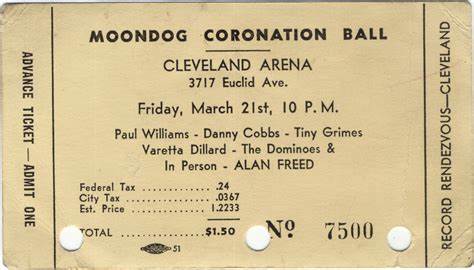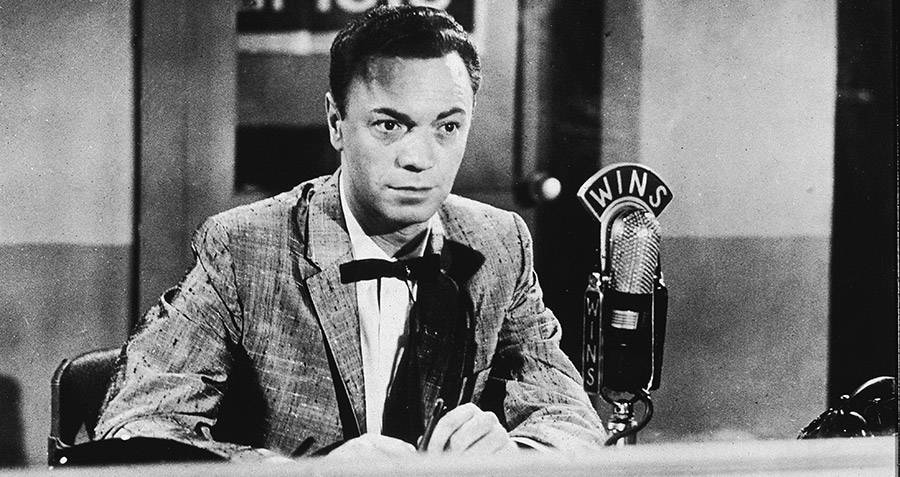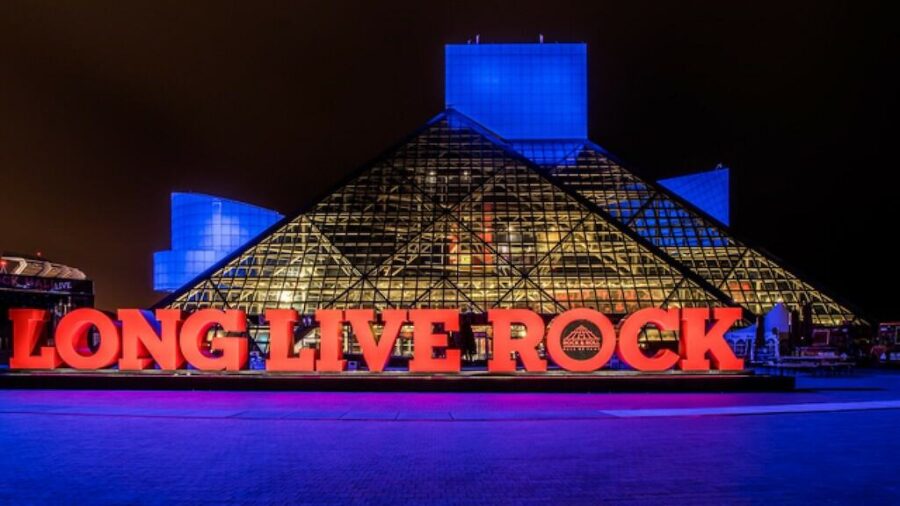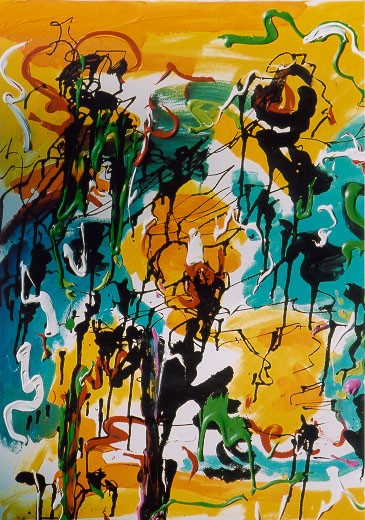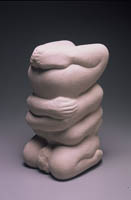The Story of the First Rock ‘n’ Roll Concert
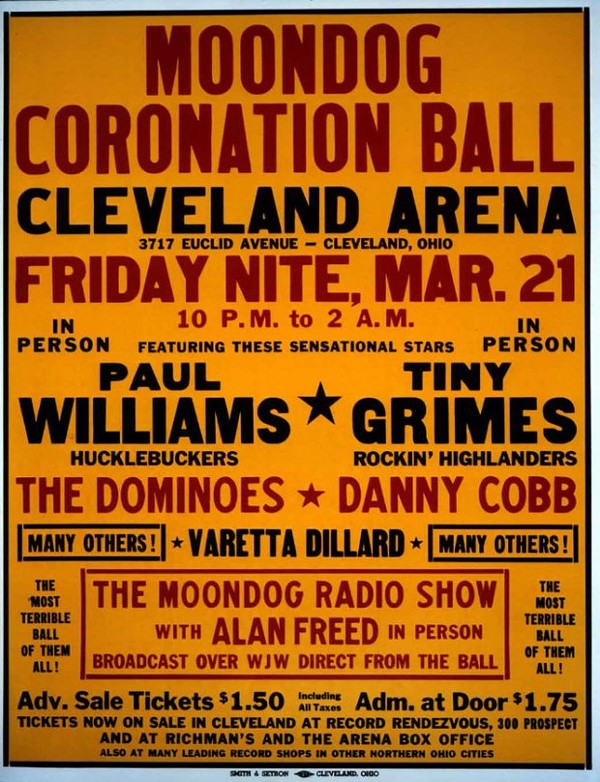
Concert poster. There are conflicting accounts about who among these artists actually performed. Paul Williams and his Hucklebuckers were the first act. Source: clevescene.com
DJ Alan Freed hosted the gathering at the Cleveland Arena, capacity 8,600. Up to twenty thousand teens showed up. What could go wrong?
Prologue: Alan Freed
Cleveland disc jockey Alan Freed, the self-styled “father of rock ‘n’ roll,” was the organizer of what is generally regarded as the first rock ‘n’ roll concert. No one person was more instrumental in the promotion of the new-fangled brand of popular music called rock ‘n’ roll, which is the natural outcome of musical interactions between Black and White people.
Freed got interested in radio while attending the Ohio State University. In the late 1940s, the young man was toiling away at Akron radio station WAKR. By lucky happenstance, Freed took up with Cleveland record store owner Leo Mintz, who excitedly described the growing popularity of Black-infused rhythm and blues among his young white customers. Freed was all ears.
The Moondog Show
Mintz told Freed that he would sponsor a three-hour, late-night program in Cleveland that showcased rhythm and blues records by Black musicians, with Freed as host. Freed joined Cleveland station WJW-AM in 1951. The “Moondog Show” became a local sensation.
The Cleveland DJ met the moment by cultivating a hip, multi-racial, “hey, man” radio persona. Along the way, the expression “rock ‘n’ roll” (then-Black slang for making love) spilled out of Freed’s mouth. By late 1951 into 1952, Freed hosted small dances, or “record hops,” to promote the music. Of course, the next logical step was to go big on performing this rock ‘n’ roll.

Alan Freed speaks to his audience at the first rock ‘n’ roll concert. The perplexed look on some of the faces in the audience would perhaps suggest that folks had no idea Freed was White. Source: bbc.com/Getty Images
Moondog Coronation Ball
They made plans for a “Moondog Coronation Ball.” Freed and Leo Mintz hired concert promoter Lew Platt to book the Cleveland Arena on Friday, March 21, 1952, at 10:00 PM, with a generous dance floor for an audience of 8,600. Tickets costing a buck fifty were sold out immediately. There were reports of ticket counterfeiting and overbooking by the concert promoters. It seems nobody kept track of ticket sales.
What happened next was thoroughly in the eyes of the beholder. The arena stood at capacity at 9:30 PM. Thousands of teenagers showed up to the sold-out venue, and, unable to purchase a ticket, pushed through the crowd to gain entrance. The “official” account: Worried that a riot might break out, fire authorities shut down the concert immediately after the opening act, Paul Williams and his Hucklebuckers, played their first song. Some beg to differ.
Cleveland Rocks
Newspaper accounts tell a different story. They describe a police detail, led by Captain William Zimmerman, waiting two hours and thirty minutes before ordering the concert to end and asking people to leave. The exit was deemed orderly.
The Cleveland Plain Dealer maintained that 6,000 people had crashed the gate. The Cleveland Press reported “a crushing mob of 25,000.”
Journalist Valena Williams gave this eyewitness report:
Paul Williams and his Hucklebuckers left the stage and Tiny Grimes and his Highlanders took over. I thought the acoustics were poor…but then I realized the din was drowning out the orchestra. I looked back at the dance floor and…it was filled so tightly that you couldn’t see anything of the floor itself.
Observing the crowd, Williams noted:
Though Alan Freed is rightfully heralded for bringing Black rhythm and blues to an integrated audience…less than one percent of [the crowd] were white.
Freed Moves On
Alan Freed took responsibility for the melee and offered an apology on his radio show. “If anyone had told us that some 20 or 25,000 people would try to get into the dance,” Freed crooned, “you would have laughed and said they were crazy.” Freed got a do-over weeks later that went smoothly, and took his show on the road throughout the state and region.
His Moondog concerts caught the attention of New York station WINS, which lured the Cleveland DJ away in 1954. Freed’s on-air handle became the “King of the Rock and Rollers,” a necessity since he lost a lawsuit claiming copyright infringement over the title, “Moondog.” Freed’s legal troubles were just beginning.
Payola
Alan Freed’s radio career took a downward turn when he got caught up in the payola scandal that made headlines in the early 1960s. Freed eventually admitted to taking bribes from record companies to play particular records. In December 1962, he pled guilty to commercial bribery and was given a suspended sentence.
Because of the negative publicity, no major market station would employ Freed. He moved to California and began drinking heavily. Alan Freed died in 1965 at age 43.
Legacy
Norm N. Nite, a music historian and author of the book, The House that Rock Built, gets the last word on Freed’s legacy:
If it wasn’t for Alan, who knows what would have happened to rhythm and blues or rock and roll at that particular time? This is where it all started…The Moondog Coronation Ball was a defining moment, especially for Cleveland. If it wasn’t for Alan Freed and that event, Cleveland would have never gotten the Rock & Roll Hall of Fame.
Alan Freed was inducted into the inaugural class of the Rock & Roll Hall of Fame in 1986.
